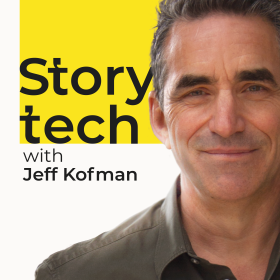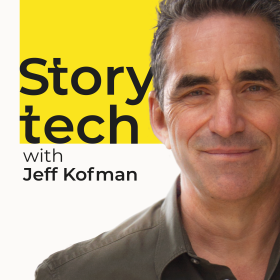
StoryTech
StoryTech is a new podcast that looks at how technology shapes the way we tell stories. From news to fiction to film to photography to podcasts to social media and even the human voice, technological innovation has inspired and enabled new paradigms in storytelling.From Trint, Antica Productions and the Newhouse School at Syracuse University, in association with WAER.
Latest Episodes
-
Famed broadcaster Ted Koppel talks about the birth of the show that defined his career: ABC’s Nightline. Advances in satellite technology allowed him to do the kinds of interviews that had never been done before, connecting people from around the world live on TV.
-
Bob Dotson spent four decades as a reporter at NBC. For most of that time, he hosted a segment on The Today Show called The American Story, which created intimate portraits of Americans who wouldn’t normally make the news. In this live episode of StoryTech, Bob Dotson talks about changes in technology, from wireless microphones to home video to iPhones, changed the way he told The American Story.This episode was recorded at the Newhouse School at Syracuse University, where Bob Dotson is a visiting professor. Archival footage from The American Story courtesy of NBC News.
-
Life was one of the most important magazines in American history, but it never could have existed without a crucial change in camera technology. Kelly McCormick, who teaches the history of photography at the University of British Columbia, tells the story of how the LEICA camera was crucial to the development of LIFE magazine, and how Life in turn was a game changer for photojournalism.
-
Carolyn Cole is a Pulitzer-prize winning photojournalist and staff photographer with the LA Times. She has covered wars, social change and the environment. She talks about how the transformation from film to digital changed her craft, for better and for worse.See the photos that Carolyn Cole won a Pulitzer for: https://www.pulitzer.org/winners/carolyn-cole
-
If the image of a man in a top hat on a horse isn’t quite what comes to mind when you think of a tech founder, then you haven’t heard of David Gestetner. He was one of the most successful tech inventors of the 19th Century. Decades before the Xerox machine, the Gestetner duplicating machine brought printing to the masses, revolutionizing the way people communicate through text. The invention changed the workplace, the way social groups organize and allowed aspiring writers to self publish for the first time.Jeff goes on a quest to find out more about David Gestetner and his invention, the Gestetner copying machine. He speaks to David’s grandson Jonathan Gestetner, as well as business historian Roger Horowitz , Director of the Center for the History of Business, Technology, and Society at the Hagley Museum and Library.
-
John Colapinto is a best-selling author of non-fiction books, including How Nature Made Him, and novels, including Undone. But he doesn’t think he could have written those books until he abandoned his manual typewriter and switched to a computer. He talks about how he started his career hammering out magazine articles on the typewriter, how he thinks that shaped his writing for better and worse, and how the typewriter shaped the work of James Joyce, Ernest Hemingway and Jack Kerouac.
-
Thanks to advances in social media and smartphones, a lot of audiences are getting information about the war in Ukraine from the people who live there, through platforms like TikTok and Instagram. Jeff talks to two women who use social media to document the effects of war: TikTok sensation Valeria Shashenok, and Anastasia Magerramova, press officer for the Ohmatdyt children’s hospital in Kyiv.You can follow Valeria on TikTok @valerisssh and follow Ohmatdyt hospital on Instagram @ohmatdyt
-
Dear Evan Hansen was a major Broadway hit with an unlikely theme – teen suicide, social media and mental heath. The show’s lead producer Stacey Mindich talks about the origin of the story, and about the technology they used to make social media come alive as a character onstage.The songs “Sincerely, Me,” “Waving Through a Window” and “You Will Be Found” from Dear Evan Hansen are featured in this episode, courtesy of the producers of the show.
-
VIetnam was the first TV war. The toolkit was 16mm film. Compared to today’s smartphones, instant video film was incredibly cumbersome. Veteran ABC News anchor and reporter Ted Koppel was just 26 years old when he was sent to cover Vietnam. It took three days for his stories to get on air. He takes us through the process and talks about how TV news changed war and changed world history.Footage of Ted Koppel reporting from Vietnam provided by ABC News.
-
How does CGI shape the way stories are told? Game of Thrones director Jeremy Podeswa shares how he pulled off what is probably the most iconic scene in the entire series: the moment when the mythic ice wall came crashing down.He breaks down the process that began with a line on a page and ended in 12 minutes of computer-produced epic drama. It took months of planning and some impressive tricks and techniques from the computer graphics team.Jeremy talks about how he learned to work with CGI directing shows like Rome and Boardwalk Empire and how CGI has fundamentally changed the TV and movie industry.Thank you to Warner Bros. Discovery for permission to use clips from Game of Thrones. Game of Thrones is streaming on HBO Max.


